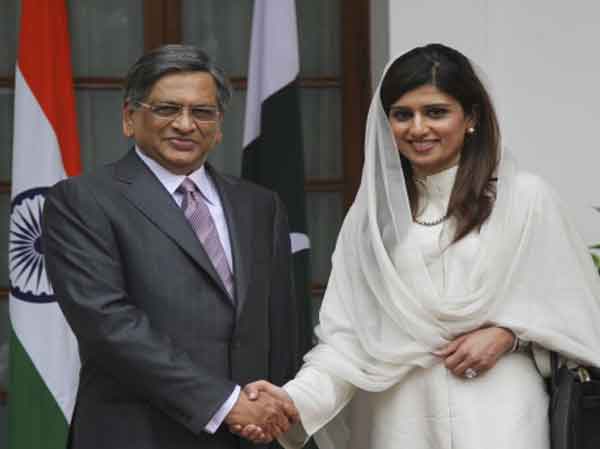Another round of the India-Pakistan dialogue has been completed with External Affairs Minister Krishna’s visit to Islamabad on September 8. The agreement on relaxing the visa regime and holding the meeting of the Pakistan-India Joint Commission after a gap of 5 years seems consistent with our policy of making progress step-by-step in normalising our relations with Pakistan.
Dialogue
Pressing Pakistan again at Islamabad to expeditiously bring to justice those responsible for the Mumbai massacre apparently conveys that we are not relenting on this key demand for determining the pace at which our relations will move forward.
The irony is that barring India’s demands on terrorism, the agenda of normalisation rests on India satisfying Pakistan’s demands.
In reality, rather than this implying that India has the upper hand in dealing with Pakistan, it is actually the reverse. Pakistan has put us on the defensive, certainly vis a vis its own public opinion, by claiming that it has taken several steps to reach out to India, that it has moved away from its traditional positions in significant ways, but that it is India that is not reciprocating. This explains Pakistani Foreign Minister’s spurious talk about “serious signals”, “breaking away from many positions we have held” and “big leaps forward” and the “need to change the mindset”. The sub-text of such pronouncements is that India has entrenched attitudes.
Such claims by Pakistan are without substance. With its parliamentary resolution in April this year, Pakistan has retreated to its old mantra that the Kashmir issue should be resolved on the basis of UN resolutions. Pakistan wants us to withdraw from Siachen, it will not agree to a rational compromise on Sir Creek and it will not end its decades old opposition to the Wullar Barrage. It covers up its uwillingness to act against the anti-India jihadi groups on its territory by the phony argument that it is itself a victim of terrorism. It will not put curbs on Hafiz Saeed as sufficient evidence to arraign him in a law court is supposedly lacking. Its record of legal inaction against the perpetrators of the Mumbai carnage is there to see.
The irony is that barring India’s demands on terrorism, the agenda of normalisation rests on India satisfying Pakistan’s demands. Pakistan wants us to demonstrate our commitment to peace by conceding what it wants, failing which the “naysayers” in Pakistan will presumably continue to consider India a threat. We should ask Pakistan to act on the basis of the glib statement by Foreign Minister Khar at Islamabad that “whatever has happened today is the past”. Pakistan should, accordingly, cease making untenable territorial claims on J&K and stop calling for- in the face of India’s known position- associating the “Kashmiri people” with the Indo-Pakistan dialogue on Kashmir. One would hope that the next time she or the Pakistani Foreign Secretary comes to Delhi she will, abiding by her own sane advice, shed past habits of confabulating provocatively with Hurriyet leaders in Delhi.
We should ask Pakistan to act on the basis of the glib statement by Foreign Minister Khar at Islamabad that “whatever has happened today is the past”. Pakistan should, accordingly, cease making untenable territorial claims on J&K…
The joint statement says, somewhat cryptically, that the two sides reaffirmed the importance of abiding by the provisions of the Indus Waters Treaty(IWT). Pakistan would have wanted this inclusion, but India seems to have worked on the language to deflect any finger-pointing in its direction. Pakistan has created an impression amongst its public that India is depriving it of its due share of water, making the issue another focal point of hostility towards India. It is determined to prevent India from constructing run of the river projects on the Jhelum provided for by the IWT by seeking international arbitration on the Kishenganga project. Again, it is Pakistan that is objecting to what India is legally doing, not India raising contentious issues with Pakistan about its projects on the rivers allocated to it.
Terrorism
India is legitimately asking Pakistan to curb terorism from its soil directed at India. It is right in asking Pakistan to prove the anti-terrorist credentials it claims for itself by not endlessly delaying the trial of those responsible for the Mumbai attack. It is truly astonishing that the pert Pakistani Foreign Minister should be “appalled” when told terrorism continues to be an issue, that this is “old time” stuff, that “terrorism was a mantra of the past”, not of the future and that India should view the Mumbai attack trial “realistically” and “not emotionally”. Equally extraordinarily, she spoke about terrorism as a dated issue on the day the US declared the Haqqani group sheltering in Pakistan and linked to the ISI as a terrorist outfit.
PM Visit
The disconnect at the political level in Pakistan between the reality of the country’s terrorist affiliation and any honest recognition of it is staggering. She, of course, failed to mention the word terrorism in her joint press conference with Minister Krishna, laying bare the scant regard Pakistan pays to our claim that we raise the issue at “every conceivable opportunity”.
Minister Khar’s position on terrorism hardly opens the door for PM’s visit to Pakistan, as he wants Pakistan to make credible progress on trying those guilty of Mumbai, besides some substantive results such as an agreement on Sir Creek. While the trade opening has occurred because of Pakistan’s dire economic situation and the visa regime relaxation benefits Pakistan much more, progress in both areas should be welcomed. Time is not, however, ripe for PM’s visit, as Pakistan wants to close the terrorism and Mumbai chapter without real delivery. Minister Khar’s egregious statements make this abundantly clear. Even with regard to PM’s visit, by pressing for it Pakistan has put us on the defensive. We are now squirming to explain why, despite his keenness to visit Pakistan, he cannot do so for the moment. We are both laying conditions for the visit and denying any are being laid.





